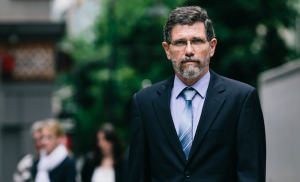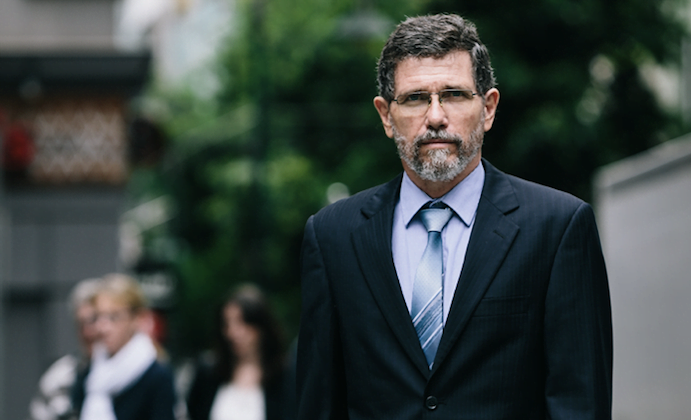 PETER Ridd’s trial in the Brisbane Federal Circuit Court has just wrapped-up after three days. With Judge Salvadore Vasta presiding, Stuart Wood QC acting for Peter Ridd (the applicant) argued the case with great skill. However, on the most critical of issues the university (the defendant) and important media refused to engage at all. Chris Murdoch QC, acting for James Cook University, refused to outline to Judge Vasta what processes it has in place for quality assurance of scientific research, and the Australian Broadcasting Corporation (the ABC) simply didn’t attend or report.
PETER Ridd’s trial in the Brisbane Federal Circuit Court has just wrapped-up after three days. With Judge Salvadore Vasta presiding, Stuart Wood QC acting for Peter Ridd (the applicant) argued the case with great skill. However, on the most critical of issues the university (the defendant) and important media refused to engage at all. Chris Murdoch QC, acting for James Cook University, refused to outline to Judge Vasta what processes it has in place for quality assurance of scientific research, and the Australian Broadcasting Corporation (the ABC) simply didn’t attend or report.
At the heart of this court case is the matter of Peter Ridd disputing media’s reporting of the health of the Great Barrier Reef back in 2015 and 2016. Specifically, Peter Ridd was first censured for proposing to a journalist in April 2016 that he investigate the state of the fringing reefs around Stone Island, which is part of the Great Barrier Reef.
Instead of investigating, the journalist sent Dr Ridd’s evidence that the reefs were in good health with spectacular coral, to his arch adversary at the university, Terry Hughes, who was claiming the exact opposite, and who promptly forwarded the evidence from Dr Ridd to university management. This began a disciplinary procedure that would eventually result in Peter Ridd’s sacking.
The trial opened on Tuesday with Mr Wood QC outlining Dr Ridd’s honestly held expert opinion that the Great Barrier Reef is in good health, but that many of his colleagues, particularly Professor Hughes, suggest otherwise, that their research is “untrustworthy” and is not subject to any “quality assurance”.
The Judge seemed genuinely interested in this issue of “quality assurance” of the research. Towards the end of Day 2 he specifically requested that Mr Murdoch QC explain to the court what quality assurance procedures were in place.
I had assumed that Mr Murdoch QC, the Barrister acting for the University, would thus begin Day 3 with some explanation of this – but he didn’t. The University continued to refuse to engage on any matters of science, particularly the issue of quality assurance. Rather the University simply argued that because there is a code of conduct that expects professors to be collegial – they thus had a right to sack Peter Ridd because he had become disrespectful of his colleagues and also had broken confidentiality.
At the beginning of Day 2 Peter Ridd clearly explained that he was concerned about the trustworthiness of the science, and the lack of quality assurance because it was having a significant negative economic impact on rural and regional economies – because of the bad publicity for tourism and increasing government regulation of farming.
It is generally agreed that modern, cohesive democracies work because there is an independent judiciary (legal system), impartial media, and a government that makes public-policy based on evidence. The judiciary and the media are generally educated university-graduates.
Universities are expected to be dominated by intellectuals, who are curious and dispassionately seek out the truth. Mr Wood QC, acting for Dr Ridd, emphasized the importance of intellectual freedom in his closing remarks today – that it is integral to a university.
Universities are expected to be places where there is vigorous discussion of contentious issues. It would be expected that where there is disagreement – for example about the condition of the fringing coral reefs at Stone Island – there could be a debate that followed rules of logic and considers evidence in an attempt to arrive at the truth.
This requires both sides to engage.
Back in 2016, and again today, instead of considering Dr Ridd’s evidence and concerns, the University choose to look away. It showed no interest in finding out about the real state of the corals surrounding Stone Island, or at the Great Barrier Reef in general.
There is a crisis in our democracy and as clearly illustrated by this court case, it is at least in part because the mainstream media and our universities too often refuse to engage in any real discussion with those who hold an opinion contradicting their own.
***************************
Calum Thwaites was also at the Federal Circuit Court today, to lend some moral support. Calum had his life turned upside down when he was sued by a Queensland University of Technology staffer under Section 18C of the Racial Discrimination Act, for allegedly complaining about segregation of computer facilities. It is never easy taking on an institution, or defending yourself against a popular meme, but more of us must do it, and more often, lest ideological fanaticism and/or the robber barons win.


 Jennifer Marohasy BSc PhD is a critical thinker with expertise in the scientific method.
Jennifer Marohasy BSc PhD is a critical thinker with expertise in the scientific method.

Thank you Jennifer for doing what you can to shine a light on things like this where the media will not. Thank you also for all your efforts to support and encourage the underdogs. I hope one day Australia will understand why we need more like you.
I for one will keep abreast of the goings on with great interest. Thank you again.
Please up the good work Jennifer , we need more like you!
Thanks for all your great work on this, Jen.
It’s very hard to get judicial decisions on “science” but in this case let’s hope it is the start of a big swing towards judicial scepticism of these “scientific” pronouncements.
Exactly what we had feared.
Peter may well be re-instated by the court and this is great news for him and his family. His courage and rational persistence is greatly admired.
But what if the Uni authorities and those academics who find Peter such a distasteful threat simply stonewall, ignore scientific debate (as they clearly have and intend to keep doing) ? The MSM have been deliberately muted so no public knowledge of the issues will force change.
This is much bloodied warfare.
Interesting that the Prof. Terry Hughes that made the original complaint is the same Prof. Terry Hughes that has his name up first on the list of researchers.
And we have all seen this type in the workplace.
What is the timeline for the decision? I assume there is an appeal process. Will the judge’s decision be delayed by any appeals?
Surely we now have the impetus to hold a royal commission into use of corrupted science over the last decade to support government agendas and policy. Gladstone was the epicenter of government realising it could influence scientific outcomes to suit policy and to avoid responsibility. With the failure of the parliament to have balance via an upper house the government also realised there was no one to call foul on the misuse of science. If this is not put to a stop then our research institutions and their capacity to improve our lives across all facets will delegated to an untrustworthy international joke.
Thank you Jennifer for your reporting on this. Do you know how long the Judge will need before he reaches a decision on this?
amazing lack of coverage by the abc who usually cover all things to do with climate change with feverish regularity. Seems that both the university and certain media are scared to have their agenda questioned and choose not to have it tested in both these court proceedings and the court of public opinion.
Just as I thought. Fort on very narrow grounds being, this is not about science we can sack who we like.
The problem is the uni. promotes shonky science.
A victory for Peter is also a victory for Truth.
Regarding the decision in this case, no decision has yet come down. At the completion of evidence, Judge Vasta said that he hope to make a decision by Easter which is pretty good.
There is then the appeals process. If JCU loses there is a fair chance it will appeal. It’s only taxpayers money so what’s to lose!!
When the climate consensus states that democracy is not up to the task of fighting climate change, apparently what they mean is that democracy must be killed so the extremists can get their way.
Fight the good fight, Jennifer.
Best wishes to Peter who is the focus of this battle against democracy.
Last comment here from me as I don’t wish to hijack this important thread.
If the court decides for Peter, one could expect JCU to stonewall to a High Court appeal.
Terribly expensive, so we will crowd-fund instantly.
Beautifully written Jennifer. Put the case most succinctly. The world is going to the dogs, & it’s back to the Dark Ages if universities continue in this intellectually bankrupt direction. Team-playing fundraising instead of the iron-clad rules of research validity? If I wasn’t witnessing it with my eyes I’d think it was the plot for a Dr Strangelove movie.
According to a rumour I’ve heard, the ABC must keep government agencies looking good or lose funding – so it’s no longer following its old rules of accurate reporting to tell the Australian public what it needs to know. I expect SBS is the same. Other media outlets also seem strangely indifferent to public best interests – accurate reports of what the public needs to know about national corruption trickle out here & there, drowned in global news. Stuff that is irrelevant to our best interests (like Hollywood scandals & every disaster on the planet) is such an information overload I almost never watch the mainstream news – it is simply not news as I once knew it. This is extremely dangerous. Peter Ridd’s case barely raises a comment in the mainstream press – but it is evidence of ruthless use of business models at universities.
I sent this article to the ABC after one of their climate change propaganda items where they interviewed Hughes re the reef. He rambled on with the usual nonsense. I complained they never interviewed scientists with an alternative point of view and mentioned their Charter requirements. They said they are to use the predominant point of view in their reporting.
https://wattsupwiththat.com/2017/08/26/an-ecologists-plea-to-dr-terry-hughes-the-public-needs-robust-science-regards-coral-bleaching-not-fearmongering/
The media are Marxists
Universities have, for want of a better word, castrated the media & the media’s upper hierarchy is complicit in this castration. For decades, universities have flooded the media job market with graduates. Graduates facing a lifetime of drudgery like stacking shelves in their local supermarket are desperate to get a job in the area they trained for. The tiny few grads who attain media jobs are v.v.v. disposable & v.v.v. cheap commodities. This tiny few can’t afford scruples & the ethic of striving to tell the public what it needs to know. This suits the upper paid media hierarchy just fine as their underlings are oh so much more controllable. This moral & intellectual vacuum is v.v.v. dangerous – just the sort of climate leading to fascist regimes – yes like Stalin’s. Ditto is happening at universities flooding job markets with save-the world graduates & postgrads in areas like environmental science & marine biology. These save the worlders too can no longer afford the scruples that once led them to choose their courses.
There are compelling reasons for solutions much stronger than a royal commission. A royal commission would likely only serve to break those pointing to the increasing epidemic of cheating at universities. Hopeful that at last justice would prevail just like the movies, these dissenters would busily put in meticulous hours & hours, evidencing submissions. Then the vast army with everything to lose would do likewise but with little evidence on its side. Eventually, the dissenters’ large body of hard evidence would win out & the commission (not trained to understand all that much of the science) would make recommendations vaguely indicating Ridd had won. This is what happened in the royal commission into the 2009 Victorian bushfires – the government authorised bushfire services to TOTALLY disregarded the royal commission’s major recommendation of 5% hazard reduction of bushfire-prone land. Ditto for an almost identical recommendation from the royal commission into the 1939 Victorian bushfires. All that happened was that bushfire services found new ways to strengthen their power base. Without government cooperation, conclusively royal commissions have no teeth, partly because so many public servants advising politicians have just so so so much to lose. These are v.v.v dangerous times. There is an army of graduates depending on covering up their research fraud,